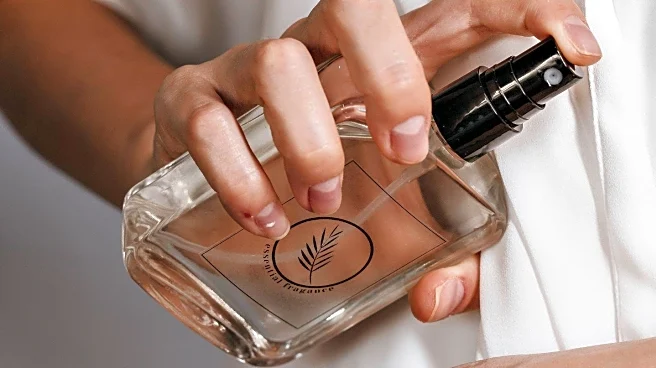What's Happening?
Fragrance experts have shared insights on how to make perfumes last longer throughout the day. The key to enduring scents lies in understanding the chemistry of fragrances and the strategic application
on the body. Perfumer Rochon emphasizes that fragrance is a blend of chemistry and memory, aiming to create a scent trail that feels natural. The concentration of fragrance, which varies from Parfum to Body Mist, plays a significant role in its longevity. Experts suggest applying perfume to pulse points, such as wrists and neck, and layering it with matching body lotions to enhance its staying power. Additionally, storing perfumes away from heat and sunlight can prevent degradation over time.
Why It's Important?
The ability to maintain a lasting fragrance is significant for consumers who invest in luxury perfumes and seek value for their purchases. Understanding the science behind fragrance application can lead to better consumer satisfaction and potentially influence purchasing decisions. This knowledge empowers consumers to make informed choices about fragrance types and application techniques, ensuring they get the most out of their products. The insights provided by experts can also impact the fragrance industry by encouraging brands to educate consumers on proper usage, potentially increasing brand loyalty and sales.
What's Next?
As consumers become more informed about fragrance application, brands may focus on developing products that cater to these techniques, such as complementary body lotions and sprays. Retailers might also offer workshops or informational sessions to educate consumers on maximizing fragrance longevity. This shift could lead to a more engaged consumer base and drive innovation in fragrance formulations that prioritize lasting scents. Additionally, brands may explore marketing strategies that highlight the science and ritual of fragrance application, appealing to consumers' desire for both luxury and practicality.
Beyond the Headlines
The emphasis on fragrance longevity touches on broader themes of consumer education and product transparency. As consumers become more knowledgeable, they may demand greater clarity on fragrance ingredients and their effects. This could lead to industry-wide changes in labeling practices and ingredient disclosures. Furthermore, the ritualistic aspect of fragrance application highlights the cultural significance of scent in personal identity and self-expression, potentially influencing trends in personalized and customizable fragrance options.










